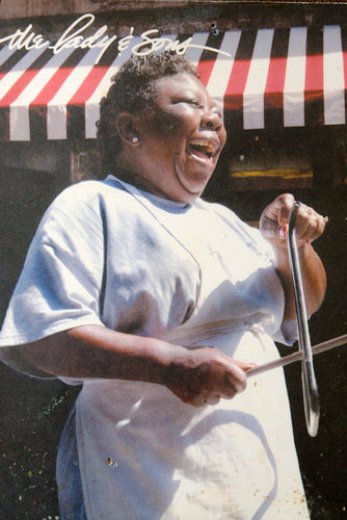Growing up, my brother and I were devoted Disneyphiles. From Walt Disney Presents to Disneyland, we loved all the fantasies as well as the marketing.

When Disney’s Song of the South aired on TV, we soaked up the colorful collection of Uncle Remus stories completely unaware of the film’s racial overtones. One story has Br’er Fox entrap Br’er Rabbit with a Tar Baby – a doll made with tar and turpentine. When we made our own “tar babies,” from a recipe offered on a box of graham crackers with marshmallows and chocolate sauce, we never had the slightest idea of what it may have meant. At ages 8 and 12, we just didn’t know.
Now however, we know better.
That was my first reaction when I read a New York Times story (July 25) about Dora Charles, a cook employed by Southern-styled Food Network star Paula Deen whom Charles describes as her “soul sister.”
“For 22 years,” The Times writes, “Mrs. Charles was the queen of the Deen kitchens. She helped open the Lady & Sons, the restaurant here that made Ms. Deen’s career. She developed recipes, trained other cooks and made sure everything down to the collard greens tasted right.”
Deen hired Charles shortly after the network chef tasted her Southern food. ” ‘If I lost Dora, I would have been devastated,’ Ms. Deen wrote in her 2007 memoir, It Ain’t All About the Cooking.”
In those early days of Lady & Sons, Charles claims, Deen “made her a deal: ‘Stick with me, Dora, and I promise you one day if I get rich you’ll get rich.’
“Now, Mrs. Charles said, she wished she had gotten that in writing. ‘I didn’t think I had to ’cause we were real close back then,’ she said.”
Besides the racial slurs made by Deen that Charles observed, the popular cooking-show host asked Mrs. Charles to announce suppertime at the restaurant by standing out front and ring an iron bell.
“I said, ‘I’m not ringing no bell,’ ” Mrs. Charles said. ‘That’s a symbol to me of what we used to do back in the day.’ ”
Eventually, Mrs. Charles’s friend, Ineata Jones, ended up ringing the dinner bell.
“For a black woman in Savannah with a ninth-grade education,” The Times continues, “it was good steady work. And Ms. Deen, she said, held out the promise that together, they might get rich one day.”
Now, however, things are different.
“It’s just time that everybody knows that Paula Deen don’t treat me the way they think she treat me,” Charles said.
Deen’s representatives say that, “Fundamentally, Dora’s complaint is not about race but about money. It is about an employee that despite over 20 years of generosity feels that she still deserves yet even more financial support from Paula Deen.”
That’s not what Charles says. According to The Times report, “Mrs. Charles says she is not expecting any money from Ms. Deen, especially not now. ‘I’m not trying to portray that she is a bad person,’ she said. ‘I’m just trying to put my story out there that she didn’t treat me fairly and I was her soul sister.’ ”
However, what stood out for me in the story was this part: “The relationship between Mrs. Charles and Ms. Deen is a complex one, laced with history and deep affection, whose roots can be traced back to the antebellum South. Depending on whether Mrs. Charles or Ms. Deen tells the story, it illustrates lives of racial inequity or benevolence.
“Certainly, power imbalances based on race exist in other parts of the country, but without the same historical resonance or familial love as in the South, said Hodding Carter III, a public policy professor at the University of North Carolina at Chapel Hill and the spokesman for the State Department under President Jimmy Carter.
” ‘It’s very hard for either one to come out and say the truth about the racial implications because it doesn’t seem so bad to either party,’ Mr. Carter said. ‘What would you think if you spent 20 years with a rich family and all you got to was a trailer? But it’s not like everybody around her was making a ton of money, either. At the Deen house, it’s, ‘Man, we were doing good by her.’ ”
Introduced to a Savannah lawyer, “Mrs. Charles and three other employees file[d] complaints with the United States Equal Employment Opportunity Commission.
“Around that time, Jamie Deen, the son who now runs the flagship restaurant, put Mrs. Charles on a salary of about $71,000 a year. Whether that decision was connected to the E.E.O.C. complaint remains in dispute. Mr. Deen says it was not. He gave her a bonus and the title of quality control manager. He even said the family would fix a rotting floor in her mobile home.”
In spite of advancements in civil rights, some still feel they can defend their actions based on cultural history. But it’s more than just the fact that we know better today.
As an owner, Deen has a moral duty to act in a certain way. This includes keeping promises, judging others fairly and treating people with respect, kindness and compassion. While Deen seems to have been kind, respectful and compassionate in the past, her cultural history would appear to indicate that a barrier between races remains very much alive in the South in general and Savannah, in particular.
Like it or not, celebrities are seen, in part, as role models. Paula Deen has the additional duty to act in a manner that is consistent with the highest level of integrity, respect, fairness and caring possible. Based on her You Tube statement andToday Show apology, I’m not sure she gets it, yet. She should know better.
Comments










